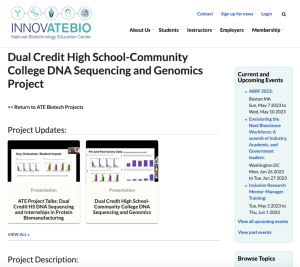Dual Credit High School-Community College DNA Sequencing and Genomics Project

The United States Biotechnology Industry has increasing demand for jobs based on DNA sequencing technology. The U.S. DNA sequencing market is estimated at $2.8 billion dollars for 2020 and on-track to grow to $5 billion by 2027, a compound annual growth rate of 16.6%. Biotechnicians with specialized training to run DNA sequencing instrumentation are needed to fill the jobs in this growing sector. Texas currently has 63 DNA sequencing facilities, 60 of which are located within 250 miles of this workforce education project. To fulfill industry needs for trained technicians in this field, Austin Community College will collaborate with the Austin Independent School District Liberal Arts and Science Academy High School to develop a DNA sequencing and genomics facility. The project will create an industry and research-based dual credit (high school and community college) academic program that focuses on DNA sequencing technology for entry-level biotechnician training. The project is designed to provide equitable access of underrepresented minority students to real-world workforce training. Students will learn laboratory techniques, have research experiences, develop job skills, receive industry-level instrumentation training, and be exposed to industry and academia as career pathways. As a result, the project team expects the project will lay the academic and technical foundation for high school and two-year community college students to enter the biotechnician workforce.
The project will provide research-based, hands-on, and real-world workforce experience for two-year community college and dual credit high school and biotechnology students by providing access to industry-level DNA sequencing technology. The project aims to increase the recruitment, retention, and certificate completion rates for traditionally underrepresented minority students in biotechnician training programs by establishing on-campus industry and academia mentored research internships. Project goals are: 1) Instrumentation acquisition of industry-level DNA sequencing technologies to establish a dual credit, high school campus-based DNA sequencing and genomics facility; 2) Modifications and updates to course curricula for the Level-I Certificate in Biotechnology from Austin Community College to include DNA sequencing and genomics technology instrumentation technician competencies and opportunities for authentic student-led research mentored by industry and academic partners; 3) Program development through establishing a DNA sequencing and genomics research-based industry and academic internship mentor network for dual credit high school biotechnology students to increase the recruitment, retention, and certificate completion rates for traditionally underrepresented minority students in STEM biotechnician training programs; and 4) Development of partnerships within the InnovATEBIO National Center member network to support the DNA sequencing and genomics technician training needs of this community and to broadly disseminate the findings of this project. The project will engage biotechnology students in authentic student-driven DNA sequencing research while working with biotechnology industry professionals, high school teachers, community college faculty, and university researchers. Furthermore, the project expects to establish best practices in workforce training in this critical area. It will disseminate project outcomes nationally as a scalable model for other high school and higher education institutions looking to create similar academic programs in DNA sequencing technology technician training. .
Comments